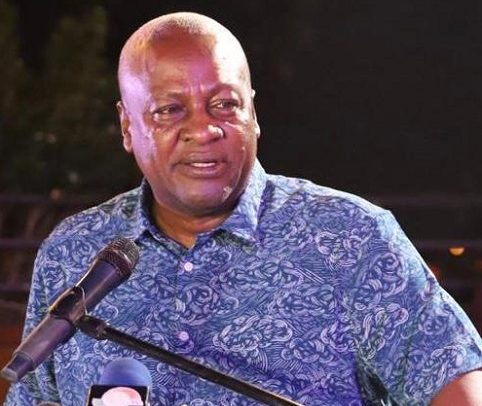Former President John Dramani Mahama is asking government to urgently organize a national dialogue on the economy just as he organised the National Economic Forum at Senchi near Akosombo in the Eastern Region when he was President.
The Senchi forum which he organised when the economy was under serious stress failed to yield positive results leading to signing off for IMF bailout.
According to the 2020 presidential candidate of the opposition National Democratic Congress (NDC), government should assembly some of the nation’s best brains to rescue the economy.
He believes that a national dialogue is the surest way to address the economic challenges.
On August 5, 2022, Standard and Poor’s (“S&P”) Global Ratings downgraded Ghana’s foreign and local currency credit ratings from ‘B-/B’ To ‘CCC+/C’ with a negative outlook.
According to S&P, the downgrade is due to intensifying financing and external pressures on the economy.
Reacting to the downgrade by an international rating agency in a Facebook post, Mr Mahama said there appears to be no end to the problems with the Ghanaian economy.
“The steep depreciation of the Ghana Cedi in recent days, clearly shows that the mid year review of the 2022 budget failed to win back the confidence of the investor community and the Ghanaian public.
“Unfortunately, no credible remedial plans have been put forward by the government to salvage the economy.
“A national dialogue on the economy, bringing some of our best brains together will serve us well, even as we prepare for debt restructuring and negotiation of an IMF programme.”
While downgrading the economy, S&P pushed Ghana’s debt further into speculative territory, lowering its foreign and local currency sovereign ratings to CCC+/C from B-/B, on Friday August 5.
It said its outlook for the country is negative, “reflecting Ghana’s limited commercial financing options, and constrained external and fiscal buffers.”
Additionally, S&P said the Covid-19 pandemic and the conflict in Russia have magnified Ghana’s fiscal and external imbalances.
Demand for foreign currency has been driven higher by several factors, including nonresident outflows from domestic government bond markets, dividend payments to foreign investors and higher costs for refined petroleum products, the agency said.
The Government of Ghana has however said it is disappointed by S&P’s decision to downgrade Ghana because bold policies have been implemented in 2022 to address macro fiscal challenges and debt sustainability which have been significantly exacerbated by the impact of these global external shocks on the economy.
The government said it will continue to be proactive in addressing the impact of these external and domestic headwinds on the economy and on the lives and livelihoods of Ghanaians.
But the Ministry of Finance expressed some reservations about the ratings, saying that “In arriving at their decision, the credit rating agency considered: (a) the lingering effects of the COVID-19 pandemic and the severe global shock of the Russian invasion of Ukraine on Ghana and the consequent fiscal and external imbalances; (b) elevated gross financing needs in the face of International Capital Market hiatus (c) the limited commercial financing options; and (d) the credible steps taken by Government to fast-track fiscal consolidation and the passage of key revenue bills.
“The Government is disappointed by S&P’s decision to downgrade Ghana despite the bold policies implemented in 2022 to address macro fiscal challenges and debt sustainability which have been significantly exacerbated by the impact of these global external shocks on the economy.
“Government will continue to be proactive in addressing the impact of these external and domestic headwinds on the economy and on the lives and livelihoods of Ghanaians. Government has implemented key revenue and expenditure measures, including the 30% cut in discretionary expenditures. The delays in the passage of key revenue measures introduced in the 2022 Budget affected revenues performance in the first half of the year. However, all the revenue measures introduced in the 2022 Budget, including the review of the MDA Fees and Charges Bill, the Tax Exemption Bill, the E-Levy Bill, have all now been promulgated by Parliament. These fiscal measures are now in full implementation mode to support our fiscal and debt sustainability policies.”
It added “The Government is committed and is confident that it will successfully emerge from these challenges in the shortest possible time as we have demonstrated the track record to do so in the Akufo-Addo led Government. Our current engagement with the International Monetary Fund for a Programme, incorporating our Enhanced Domestic Program (EDP), is expected to support our drive to restore and sustain macroeconomic stability; debt sustainability and promote growth and job creation whilst ensuring social protection to achieve our vision of a Ghana Beyond Aid.”
By Vincent Kubi

